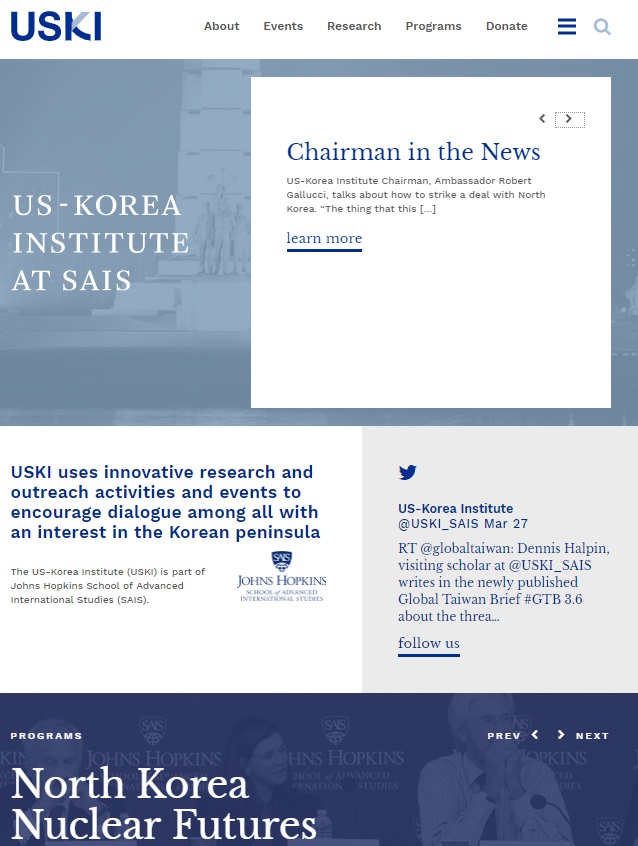Posted on : Apr.11,2018 17:52 KST
 |
|
한미연구소(USKI)홈페이지
|
The US-Korea Institute (USKI) at the Johns Hopkins School of Advanced International Studies (SAIS) is set to close down in May after a controversy over lax budget reporting practices and pressure to replace its director. While the institute may be shutting its doors, a number of issues remain to be addressed. In a nutshell, this episode seems to be mainly about a longstanding lack of transparency in USKI’s operation without any management or oversight.
In the 11 years since it was founded in 2006, USKI has spent a budget of over 20 billion won (US$18.8 million) in South Korean taxpayer money. During that time, it has merely produced one- to two-page account statements, and poor quality ones at that. That’s why the ruling and opposition parties moved last year to attach a “supplementary opinion” asking for steps to improve the lack of transparency and a report on the progress by March of this year when they passed their budget support motion.
It was reportedly on this basis that the board for National Research Council for Economics, Humanities and Social Sciences (NRC) – the institution under the Prime Minister that is in charge of final management and oversight for USKI – made its decision to replace Jae H. Ku as director. When USKI refused to accept this, the board decided to cut off budget support as of this June. The institute has argued that the Blue House is trying to drive out a director who is close with conservatives, and the conservative media are describing the case as “the Moon Jae-in administration’s version of a cultural blacklist.” But the circumstances show this characterization is not a convincing one.
Instead, the National Assembly appears to have been on the money last year when it raised issues about USKI’s lax spending habits and lack of research results. Since its establishment, the institute has spent half its budget to pay for its staff – including Ku – while devoting just a quarter of its money to key projects like training Korean studies experts. A look at its 2016 account statement shows it spending US$80,000 on a “joint seminar with Stanford University’s Hoover Institute” that was not on its original project plan – and providing no after-the-fact report. As director for the 11 years since USKI’s establishment, Ku basically accepted huge amounts of taxpayer money to spend as he saw fit. For the administration to do nothing about this would be dereliction of duty.
Some are arguing that the administration went too far with its pressure for the USKI director and vice director’s resignation. The facts on that matter will need to be addressed separately. But it’s baffling to see a matter of lax management being painted as “blacklisting” by the Moon administration. In any event, USKI is closing its doors now. Hopefully, the administration will treat this as an object lesson and make a new budget support plan that stays true to the original aim of educating students to become experts on the Korean Peninsula.
Please direct questions or comments to [english@hani.co.kr]






